- Home
- Jeff Sutton
Alien From the Stars Page 15
Alien From the Stars Read online
Page 15
He had another thought. "Besides, I know all about Barlo."
"You do?"
"He let me look into his mind."
"He let you...look into his mind?"
"He projects his thoughts into my mind, but it's the same thing,"
explained Toby. "I saw a lot of things on his world. It's called Raamz. And on other worlds," he added.
"Saw?"
"Pictures, like looking at television, only the screen was in my mind."
He told of his visions of the tall pink buildings jutted against the dusky red sun, of the aircars soaring through a darkened sky, of planets that were new with life, of others that were dying. He told, too, how he'd pierced the black night through Barlo's nocturnal vision. "The blackness turned to gray, like the onset of dusk," he finished.
"That's not the same as telepathy," the Attorney General accused.
"He said it wasn't."
"The alien? He made you see exactly what he wanted you to see!"
Toby looked at him, thinking that Linda had said exactly the same thing.
Not knowing how to answer, he remained quiet.
"So we don't know anything about his world at all," the Attorney General pursued. "We know only what he wanted us to know."
"I don't think that's it at all," Toby flared.
"How would you know?" demanded the Defense Secretary.
"Well, you get a feeling about people." He groped for words. "It's just something you know."
"Just something you know," intoned the Attorney General. He exchanged significant glances with the Defense Secretary.
"Gentlemen!" The President looked at Toby as if to phrase the inquiry in a different manner but instead asked, "Did he mention anything about his government or the governments of other worlds?"
"Not exactly." Toby wrinkled his face. "He told the sheriff that each sun, each planet, each race was different but that all the races lived in peace and harmony."
"Ah!" the Secretary of State exclaimed.
"He said it was necessary."
Page 73
"Why did he tell the sheriff that?" asked the President.
"The sheriff asked him what it was like out there."
"Mr. President?" asked General Kalmer suddenly. "May I ask a question?"
"Go ahead, General."
"What kind of armed forces do they have? Did he say?"
"I don't believe they have any." Toby told about the disaster and rescue units. "I think that's all they have, but he did say they hadn't had an interstellar war for more than a million years."
"That's exactly what I would expect him to say." The general smiled coldly. "But we know he carries weapons."
"Weapons?" Toby stared blankly at him.
"Some sort of a ray gun. He's started two fires that we know of."
"Oh, that." Toby explained how the alien hadn't used the rays until the dogs were almost on him, then had burned the grass to stop them but had been careful not to hit them. "He said that no life should die violently," he explained.
General Kalmer's eyes seemed to bore right through him, as did the eyes of the Defense Secretary and the Attorney General. Toby thought it clear that they were afraid of Barlo, but they also wanted the star drive. It was more what he sensed than what they'd said. But the Secretary of State didn't think that way at all. Neither did the President. He drew hope from that. The
President mainly listened as if weighing each morsel, but his eyes were kind.
He felt better as the conversation went on. There was even a small chuckle when he told how Gramp and Barlo had played pinochle under the glare of the lamp in the hayloft. There were scores of questions, many of which he recognized as rephrasings of earlier ones. He tried to answer them as clearly as he could. He wished they would bring Barlo here, talk with him. But he knew they wouldn't, not since they'd learned that Barlo was telepathic. That had really scared the general.
Finally the President rose and thanked him. An aide entered to escort him from the room. His last view, as he glanced back from the doorway, was of the President. He stood tall and thoughtful, his eyes for the moment looking at nothingness. Toby had the wild impression that the President was all alone in the big smoke-filled room.
He wondered what the President was thinking.
"If but one race of the thousands allegedly up there is hostile, we could be in serious trouble,"
declared General Kalmer. He thumped the table to emphasize the point.
"Correct," the Defense Secretary snapped. "I'm not willing to accept that shipwreck story. It's quite likely the creature's appearance on Earth is some sort of a psychological gambit, perhaps to test our reaction."
"It's a matter of viewpoint," declared the Secretary of State. His eyes sought the support of the Secretary of the Treasury. "I firmly believe..."
The President listened idly, part of his mind on the youth's judgment of the alien. Could the perceptions of youth be sharper and more accurate than those of adults? Certainly their judgment wasn't as clouded by the myriad of prejudices and preconceptions that most adults were prone to erect in defense of their own particular views -- views that all too often merely served as barricades against anything that might assault their sense of security and well-being.
But was the youth's judgment sufficiently penetrative? It was extremely unlikely that he could assess, or even suspect, the many reasons the alien might have come to Earth. Also, he would be far more likely to take the
alien at face value than, say, any of the men here tonight. With the possible exception of the Secretary of State, he amended.
His eyes roved the table. The general's job was to defend; no one could argue that point. By Page 74
expecting the worst, the general would be prepared for the worst, and that was as it should be.
As such, he had to stand at one wing of the balance. So did the Defense Secretary. But that was why they had counterbalances. If the general represented one extreme, the Secretary of State certainly represented the other. Moderation? He smiled whimsically. To both extremes the middle course represented a dangerous compromise. Yet it was moderation that had kept the world intact as it spun through the dangerous web of history. Ironically, history remembered its extremists but seldom others.
Or did that reflect the cynicism of his time?
He let his mind wander. He could remember -- oh, how many years ago! --
when he had been a youth much like Toby Adam. How much simpler the world had seemed then; how much clearer. Then slowly, with maturity and experience, the clarity had lessened, for a man no longer was simply a man, to be judged as such, but was a being of purpose, guile, whimsy -- a two dimensional man clothed in a cloak of four-dimensional attributes. All too often a man was judged by his words rather than his deeds, or by how well he agreed with the person making the judgment. The eye sought to see the unseeable rather than what was to be seen.
Wisdom had been called the ability to ride the vanguard of public opinion. Or was that, too, cynicism?
But there had been something extremely refreshing about young Toby Adam, perhaps because he had judged the alien without looking for a motive. Could that be it? Perhaps the youth had seen the alien as he really was rather than as what he represented in the minds of the rest of them.
Possibly the youth understood the alien far better than all the experts lumped together who had been dissecting "the creature from Mirach," as his science adviser had tabbed him.
He raised his eyes to the littered table, the haggard faces. He listened again to the often querulous, often beseeching voices, yet in reality scarcely heard them. They were like rain on the roof. It was often that way, he reflected, once he had reached a decision. Although in reaching it he had balanced the arguments in his conscious mind -- weighing, pitting one against the other, extrapolating each to its ultimate significance and meaning -- the final decision always seemed to well from deep in his subconscious, fashioned by what crucible he couldn't hope to guess. It was th
at way now.
"Gentlemen!" He leaned forward and rapped the table sharply.
The room grew still.
Igor Kuznetsov, alias William Clayton, lay quietly alongside the agent Conrad in the dense hillside brush that overlooked the sprawling Army encampment. Despite the shade afforded by the mesquite, the heat of the day had become all but intolerable. Sounds from the camp below drifted up through the still air.
Kuznetsov's thoughts were fatalistic, yet determined. Following the capture of their three companions by the vigilantes, he and Conrad had managed to follow the boy on his return across the field. From a safe distance they'd witnessed the scene between the boy and the officer who had arrived fortuitously -- had seen the strange figure in the reddish garb. Creeping closer, Kuznetsov had glimpsed the small face with the large violet eyes, immediately had realized that this must be the creature from another star.
Kidnap him or kill him -- his instructions had been clear, but the top priority had been in seizing the alien. If he could kill the officer...With that in mind he and Conrad had been creeping closer, when suddenly they'd heard the movement of horses. An instant later the vigilantes had appeared, and within moments an Army patrol had enclosed the entire group. Kuznetsov shuddered at his close escape.
Before withdrawing he'd learned one startling fact: David Harper, whose true name he'd never known, was a double agent. Undoubtedly, by now the FBI
knew the names and activities of every member of the apparat.
Page 75
When finally the soldiers had marched away with their prisoners and the two jeeps had escorted the squad car back toward the Army encampment, he and
Conrad had hurriedly returned to San Diego. Before the night had scarcely begun, he was once again closeted with his superior. He'd accepted his new orders stoically but with a pang at the knowledge that, for him, the road to
Moscow was forever closed.
Now, lying with Conrad in the underbrush, his instructions were clear: Kill the alien! This time both carried the paraphernalia they might need, including sharpshooter rifles equipped with nightscopes. Sooner or later the creature from the stars would be brought into clear view, if only to be taken to one of the helicopters for transportation to another area.
But they couldn't fire prematurely, couldn't take a chance on missing. Kuznetsov gripped his rifle determinedly.
"How do you know he's still in the Army camp?" Conrad had asked earlier.
"He is." He'd answered with assurance, for Luce had stated that the creature would remain there for the time being. And Luce had known. It was the kind of thing Luce would know, for his lines of information, devious and far-reaching, came down through a network that penetrated the most sensitive areas of government.
Kuznetsov had no illusions regarding what might happen when they killed the alien; They would get short shrift. Conrad knew it, too. But it was for the Party; they both understood that. It was the creed by which they lived and would die. There was but one thing to be dreaded: failure. But they wouldn't fail. Gazing down at the Army encampment, Kuznetsov felt the steady beat of his heart -- felt secure in the knowledge that, after all, he was one of the fortunate ones. By a single shot he could change the course of history.
That was power!
TWELVE
Los Angeles Times
Los Angeles, California, August 2, 1974
DOD OFFICIAL CALLS WAR GAMES IN EKLUND VALLEY "ROUTINE"
WASHINGTON, AUG. 1 (AP) -- Amid wild rumors of alien spaceships, extraterrestrial creatures and Russian spies, war games continued today unabated in Eklund Valley near San Diego, California, where the excitement began with flying saucer reports and a spy scare one week ago. A giant ape with a ray gun was also reported at the time.
One rumor that appears founded on fact is that three Russian agents were apprehended in the valley. A Defense Department spokesman said, "Russia always sends agents to observe our war games." He cited the large number of Russian submarines that regularly frequent our coasts and the constant infringement of our air space in the far north. He told reporters that the present war games were "strictly routine."
Other reputable government observers remain unconvinced that the entire story has been told.
They point out that metal fragments found at the scene of the spaceship's alleged destruction were reliably reported to have come from beyond the solar system.
A scientist high in government councils told the press that "the entire story will be made public within a few days." He refused to state whether he was speaking of extraterrestrials, spaceships or Russian spies.
On other fronts...
The general got his ring of steel.
The President had agreed that it should be there but had insisted that it be placed as inconspicuously as possible while still being able to cover the low hill where the alien had indicated the rescue craft would land. In good conscience he couldn't have done otherwise, for no one could be certain of the alien's true thoughts or that they represented those of his race.
Page 76
The knowledge that the alien was telepathic had shaken them all.
The ring of steel consisted of a number of heavy tanks hidden under heaps of brush on all sides of the hill. Similarly camouflaged mortar batteries also covered the site. And when darkness shrouded the hill, several battalions of specially armed troops were slated to move up the slopes to the immediate vicinity of the landing. Photographic units capable of night operations would record the scene. There was also the usual proliferation of public information officers. For good measure, several squadrons of supersonic jets ready for instant takeoff waited on the strip at George Air Force Base, but only a few flight minutes away.
But the Secretary of State had also had his say. The ship was to be met officially by the Under Secretary of State and a number of aides (two of whom were with the CIA). Despite the Secretary's protest, the official party also included General Brockler, who had served as the alien's host during his stay at the Army encampment. General Kalmer had been adamant on his inclusion.
The Under Secretary was to welcome the visitors, extend the official hand of friendship, and invite their leaders to Washington, where, hopefully, the way could be paved for the future exchange of ambassadors.
The alien had made no comment when apprised of the preparations with regard to the Under Secretary's role. Instead, he had asked to be accompanied to the rendezvous by Toby, Gramp, Linda, and the deputy sheriff. "They are my friends," he'd explained. That was how matters stood when, several days later, he'd quietly announced that the rescue ship would land that night.
Now, shortly after the onset of darkness, Toby and Gramp flanked the alien as they started up the hill. Linda and the sheriff followed close behind. They walked slowly, in silence, as if each were aware of the solemnity of the moment. Toby sensed it to be a moment of happiness, for Barlo would be returning to his people; a moment of sadness, for he was losing a friend. He wondered if Barlo would feel the separation as keenly as he.
Ahead, silhouetted against the sky, he saw the Under Secretary and his group waiting. Their figures were still, huddled close, and for some reason he fancied they were watching the first stars of night. Although he saw no other sign of life, he had the uneasy impression of being watched. Straining to see into the darkness, he perceived only the ghostly blobs of bushes, the occasional whiteness of shale outcrops. The distant chirrup of crickets floated in the still air.
Occasionally he heard a soft murmur from Linda or the sheriff.
He was thankful for the solitude. The press and broadcasting media had broken the story that morning -- a garbled account to the effect that the strange spacecraft which reportedly had landed in a valley east of San Diego more than a week before and which allegedly had been destroyed through some nuclear means had in reality come from the stars. The story of the giant gorilla with the ray gun had been resurrected; so had the stories of Russian spies.
The President's discomfited Press S
ecretary had admitted only that an official investigation was being made. He'd refused to comment when asked if there was any relationship between the alleged spacecraft and the Army maneuvers being held in the area. The Pentagon remained mum. But the news
media, in highly distorted versions, had clamored the story all day.
Since then the traffic had been almost bumper to bumper on Interstate 8.
Now the headlights formed a long glistening swath as the vehicles were kept moving by Army patrols. Toby dreaded to think of what might happen if the cars were allowed to stop.
The ship will be coming soon. The telepathic words brought back his attention. He glanced at Barlo's slight figure, at the large violet eyes agleam in the night.
I'm glad for you, but I'm awful sorry that you're going, he answered.
It is a lovely planet.
Except for our sun; you didn't like that.
Page 77
The nights are quite pleasant, countered Barlo. His step faltered, and Toby saw his head jerk around abruptly.
What is it? he asked worriedly.
Danger!
The soldiers?
No, the soldiers are all around us. It's others.
Who? Toby asked urgently. A sense of dread assailed him.
I can't isolate the source. The mind-thought is like a wave. But I know...Yes it's two people.
Who? he repeated desperately.
The Russians -- the men I sensed before.
Russians! He was appalled.
The man named Igor Kuznetsov and another, Conrad. They've moved up the slope with the soldiers. They intend to kill me.
I'll tell the sheriff!
No!
But...
I was speaking of their intent, interrupted Barlo. I'm quite certain I'm safe.
You can't take the chance, Toby protested.
I'll have to leave more abruptly than I'd planned, answered Barlo. He turned his head toward Toby, his violet eyes enormous in the night. Listen closely, he commanded. He began talking about Earth and its future. Earth was not yet ready for the stars -- that was the gist of what he had to say. Toby felt a great sorrow. Suddenly the stars seemed infinitely far away.

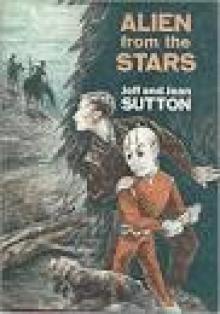 Alien From the Stars
Alien From the Stars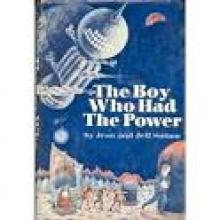 The Boy Who Had the Power
The Boy Who Had the Power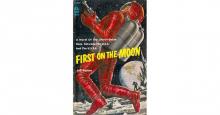 First on the Moon
First on the Moon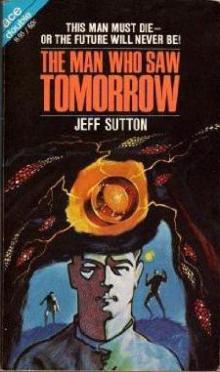 The Man Who Saw Tomorrow
The Man Who Saw Tomorrow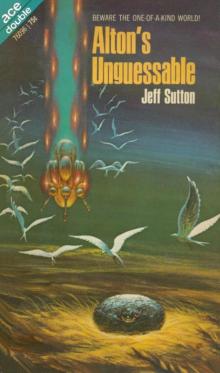 Alton's Unguessable
Alton's Unguessable